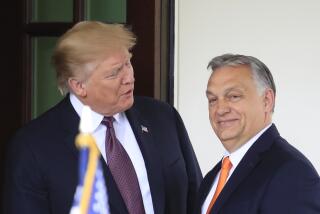Hungary’s Premier, Buffeted by Voters, Will Meet Bush : Europe: Opponents say election results show the public is disappointed in what he has accomplished.
- Share via
BUDAPEST, Hungary — Prime Minister Jozsef Antall and President Bush have common ground for commiseration when they meet Thursday in Washington: Both are caught up in a storm of second thoughts among the voters who put their parties in power.
Antall’s center-right coalition took a drubbing in local elections that will give opposition Free Democrats control of Budapest and bolster the liberals’ claims that Hungarians want radical action on the worsening economic crisis.
The Free Democrats contended Monday that their success in Sunday’s final phase of the political metamorphosis from socialism to democracy suggests that voters are disappointed with what Antall’s government has achieved in the six months since it was elected.
Even in small towns and villages in the conservative heartland, voters opted for independent candidates or the agrarian Smallholders Party over Antall’s Hungarian Democratic Forum.
But only 27% of Hungary’s eligible voters turned out for Sunday’s balloting--the sixth in less than a year--indicating that apathy and disillusion may be the strongest forces in Hungarian politics.
Little progress has been made to date on biting the bullet of economic reform because the two main political factions in Parliament have been bogged down in partisan wrangling over how it should be done.
Antall, who flew to New York on Monday for a weeklong U.S. visit that will take him to Los Angeles as well as Washington, said on Hungarian television that his coalition’s losses are painful but not necessarily a harbinger of disaster.
“They can now experience for themselves what it means to govern,” the prime minister said of the liberal opposition.
Antall also pointed out that West Germany’s major cities are controlled by leftist parties while Chancellor Helmut Kohl’s conservatives govern effectively, Antall said, on the national level.
The resemblance may end there, however, as Hungarians stagger under the weight of $20 billion in foreign debts inherited from a Communist regime that borrowed to fund consumption rather than sound investments.
Inflation of more than 30% is beginning to erode living standards, stirring up public resentment, and the government has barely touched the gargantuan tasks of price reform and privatization.
On his U.S. visit, Antall plans to press Bush for more American aid to Hungary and a Western relief plan to counter the devastating effects of the oil crisis on Eastern Europe’s fragile new democracies.
While Antall was heading west immediately after the election, the victorious Free Democrats and FIDESZ, the Federation of Young Democrats, declared themselves ready to act decisively to get Hungarian cities on the road to recovery.
The Free Democratic candidate who is expected to be named mayor of Budapest, where one in four Hungarians live, is a sharp contrast to the dour and sometimes hesitant figures that make up the national leadership.
Gabor Demszky, a 38-year-old lawyer who was repeatedly beaten and jailed for anti-Communist dissent under the previous regime, has gained a reputation for bold and controversial behavior to press his point.
He brought a live shell from a Soviet base into Parliament last summer to draw attention to the dangerous refuse being left behind by departing Red Army troops.
The Alliance of Free Democrats won 35% of the vote in Budapest, and its youth coalition partner FIDESZ received 18%, giving them a combined majority and the right to choose a mayor and a municipal council to govern this city of 2.5 million. The Forum won about 27% of the vote.
More to Read
Sign up for Essential California
The most important California stories and recommendations in your inbox every morning.
You may occasionally receive promotional content from the Los Angeles Times.











